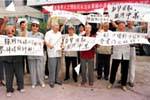 |
Japanese PM's Visit to "Yasukuni Shrine" Criticized

Japanese PM's Visit to "Yasukuni Shrine" Criticized
Historians, war victims and witnesses, veteran soldiers, and massacre survivors gathered Tuesday to condemn Japanese Prime Minister's visit to the war criminal shrine.
Zhang Yibo, whose father was buried alive by Japanese soldiers during World War II, voiced his resentment and objections against the official visit to the "Yasukuni Shrine" by Japanese Prime Minister Junichiro Koizumi.
He said that the Japanese Prime Minister's behavior deeply hurt the feelings of Asian people who suffered from Japanese aggression over 60 years ago. It was an arrogant provocation to the peace- loving people from several countries.
Wang Songlin, who was once forced to be slave in Japan, said that the official visit to the Shrine was a denial of the aggressive wars launched by Japan and war crimes it has committed.
The visit has jeopardized the friendly relations between Japan and other Asian countries. Wang warned that those who are set in their ways to repeat history are digging tombs for themselves and are doomed to failure.
Xing Ancheng, a professor of modern history with Liaoning University in northeast China, said that Asian people should be aware that militarism could come back.
On September 18, 1931, Japanese troops attacked the Chinese army stationed in northeast China and then occupied Heilongjiang, Jilin and Liaoning provinces in the northeast. That day is regarded as a day of humiliation among Chinese.
Scholars from China, Japan, and the Republic of Korea, and some survivors of the Nanjing Massacre at the memorial hall of the Nanjing Massacre victims in east China's Jiangsu Province slammed the Japanese Prime Minister's visit to the war criminal "shrine".
Zhu Chengshan, head of the memorial hall, noted that the visit and the history textbook event were of the same origin reflecting rightist tendencies in Japanese politics.
He said that many Japanese friends passed on the protests of Japanese people Monday.
Zhu stressed that the Sino-Japanese relations should be based on respect for history.
ROK professor Lim Ki-won urged Japan to take Germany as an example and make a thorough introspection of history and offer an apology.
Yang Shaorong, 88, a survivor of a massacre at Zhongshan dock in Nanjing City 64 years ago, said that the visit was an insult to war victims like him.
The victims read out a letter of protest to the Japanese Prime Minister at the meeting.

In This Section

|